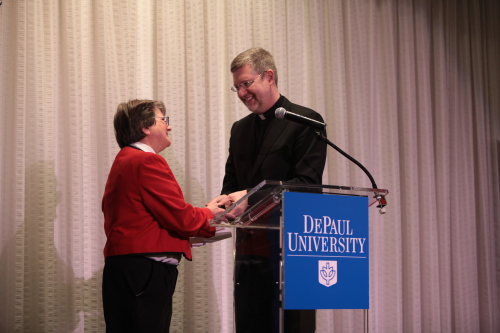May 08, 2012
Noted Anti-Death Penalty Activist Sister Helen Prejean to Visit DePaul for May Lectures, Opening of Exhibition on Her Life and Work
Noted Anti-Death Penalty Activist Sister Helen Prejean to Visit DePaul for May Lectures, Opening of Exhibition on Her Life and Work
Sister Helen Prejean, C.S.J., the activist and author whose book “Dead Man Walking” helped fuel the current anti-death penalty movement in the United States, will appear at DePaul University May 14 to dedicate an exhibition highlighting her work to end capital punishment.
“In Deeds and Words: The Prejean Ministry Against the Death Penalty” examines notable moments in Prejean’s 30 years of advocacy on behalf of death row inmates and her activism to abolish the death penalty. The exhibit highlights her relationships and correspondence with individuals on death row. It also highlights the process of writing her best-selling books, “Dead Man Walking” and “The Death of Innocents,” and adapting the former for the 1995 film starring Susan Sarandon and Sean Penn.
The exhibit will be open to the public Monday through Friday from 9 a.m. to 5 p.m. through Nov. 30 in DePaul’s Special Collections and Archives, Room 314 of the Richardson Library, 2350 N. Kenmore Ave., Chicago.
Prejean also will participate in a series of classroom lectures, talks and other programs at DePaul throughout the week, including two open to the public. She will attend a staged reading of a one-act adaptation of “Dead Man Walking” on May 14 at 7 p.m. and lead a discussion afterward.
On May 15 at 7 p.m., Prejean will present a lecture titled “Dead Man Walking—the Journey Continues,” in which she will reflect on current efforts to roll back the death penalty around the country. A 6:30 p.m. reception will precede the talk.
Both programs are free and will be held at Cortelyou Commons, 2324 N. Fremont St., Chicago, but reservations are required at eventRSVP@depaul.edu.
On May 16 at 6:30 p.m., Prejean will participate in a public conversation about the writing process behind her past best-sellers and her upcoming book “River of Fire.” The program will be held in Room 220 of the Lincoln Park Student Center, 2350 N. Sheffield Ave., Chicago.
“Sister Prejean has long been a leading light in the fight for social justice across a wide spectrum of issues, especially the movement to end capital punishment in the United States,” said the Rev. Dennis H. Holtschneider, C.M., DePaul’s president. “We are deeply honored that she has chosen DePaul to preserve the record of her life’s work.”
Prejean first announced the donation of her archives to DePaul in February 2011, coincidentally just after the Illinois Legislature’s surprising vote to abolish the death penalty. She was invited to consult on the issue with Illinois Gov. Pat Quinn, who signed the legislation several weeks later, making Illinois the 16th state in the nation to outlaw capital punishment. In recent months, Connecticut has repealed its death penalty and a referendum has been placed on the November ballot asking California voters if that state should abolish capital punishment.
The launch of the Prejean exhibit coincides with the opening of Prejean’s papers for researchers and academic use. The collection is multifaceted and contains rich resources not only on the issue of capital punishment, but also in charting the development of Prejean’s activism, the process of writing and publishing a book, and the social justice issues that underlie much of the death penalty debate.
Prejean also will have several private meetings throughout her visit with students and faculty around DePaul, including with Andrea Lyon, professor of law and director of DePaul’s Center for Justice in Capital Cases, which provides legal assistance for those charged in capital cases.
About DePaul

Sister Helen Prejean, C.S.J., and Rev. Dennis Holtschneider, C.M., DePaul's president
